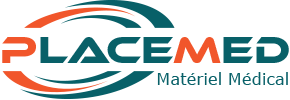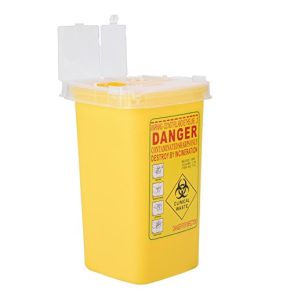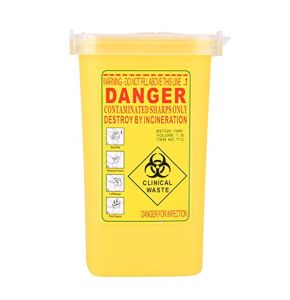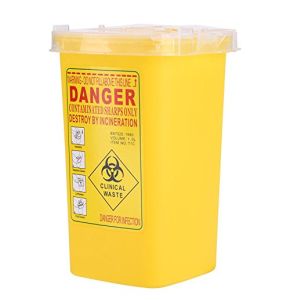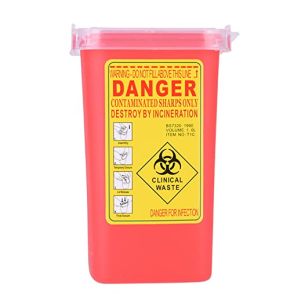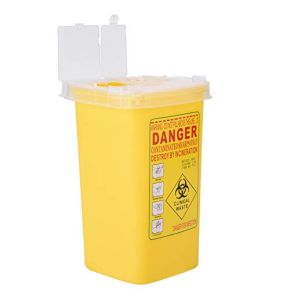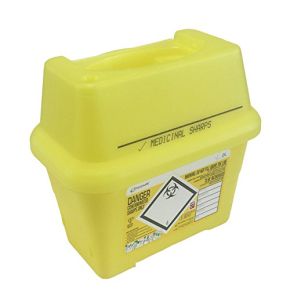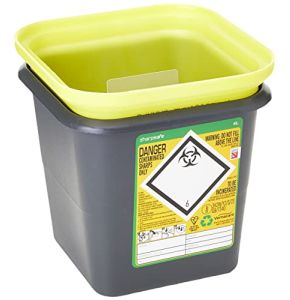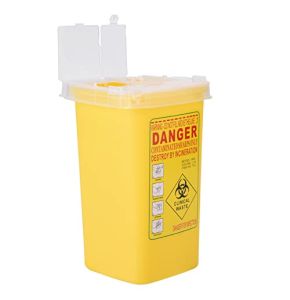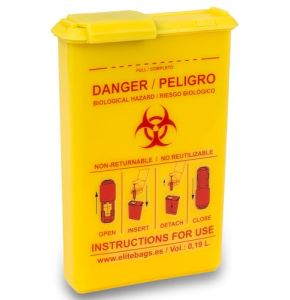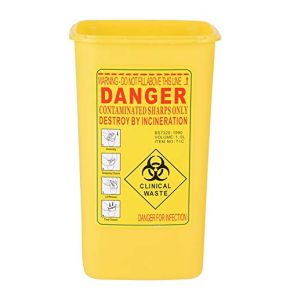Medical waste bin
18/11/2024 237
18/11/2024 272
18/11/2024 260
18/11/2024 325
18/11/2024 243
A Suitable Medical Trash Can: Ensured Health Safety!
Medical waste management plays a very important role in preventing infections in healthcare settings. Every day, facilities generate a large amount of potentially hazardous waste. Using an appropriate medical trash can ensures safe and compliant disposal according to current standards. This protects not only the healthcare staff but also patients and the environment.
Discover our selection of medical trash cans specifically designed for the needs of healthcare facilities. Each model in our range is designed to ensure optimal management of medical waste, adhering to the strictest hygiene and safety standards. Whether you are a small medical office or a large hospital, you will find the ideal solution to safely and efficiently dispose of potentially infectious or hazardous waste.
Why is it important to use specific medical trash cans in healthcare settings?
In healthcare environments, medical waste can be dangerous. It may contain infectious, toxic, or radioactive substances. If not managed properly, this waste can cause infections, injuries, or environmental pollution. Using a specific medical trash can significantly reduces these risks.
Medical trash cans are designed to securely contain special waste. They are often made with puncture-resistant materials and feature airtight lids. This prevents the spread of germs and protects staff, patients, and visitors.
Poor management of medical waste can lead to serious consequences. Nosocomial infections can spread. Accidents involving exposure to used needles can occur, posing risks of contamination by HIV, hepatitis B or C. Additionally, facilities may be penalized if they do not comply with regulations, which can harm their reputation and incur additional costs.
What types of medical trash cans exist and what are their specific uses?
There are several types of medical trash cans, each suited to a specific type of waste. Proper waste classification allows for effective and safe disposal. Here are the main types of trash cans and their uses:
- Infectious Waste Bins: Used to collect contaminated waste, such as soiled dressings, used gloves, compresses, and other materials that have come into contact with blood or bodily fluids.
- Sharps Containers: These rigid, puncture-resistant containers are used for needles, syringes, scalpel blades, and any cutting or piercing instruments. They feature secure closure systems to prevent injury risks.
- Anatomical Waste Bins: Intended for human-origin waste, such as tissues, organs, or body parts from surgical procedures or autopsies. They are equipped with airtight closure systems to prevent odors and contamination.
- Chemical and Pharmaceutical Waste Bins: Used for chemical products, expired or unused medications, and waste containing toxic substances. They are designed to withstand corrosive substances and prevent leaks.
- Radioactive Waste Bins: Specially for waste containing radioactive substances used in radiotherapy or medical imaging. They are marked with specific pictograms and require special handling.
Each medical trash can is generally color-coded and labeled with pictograms. This allows for quick identification of the type of waste it contains and prevents errors. For example, yellow containers are often used for sharps, while red bins may be designated for infectious waste.
What are the regulations regarding the disposal of medical waste?
The disposal of medical waste is strictly regulated to protect public health and the environment. Healthcare facilities are required to comply with existing laws, which define the procedures for the collection, transport, and treatment of waste.
In France, medical waste management is governed by the Public Health Code and the Environmental Code. Waste from healthcare activities with infectious risks (DASRI) must be collected and disposed of according to specific procedures to avoid any risk of contamination.
Legal Standards to Follow
- Separate Collection: Medical waste must be separated from household waste at the point of generation. This prevents mixing and facilitates appropriate treatment.
- Approved Containers: The containers used must comply with standards, such as the NF X 30-500 standard for DASRI. They must be durable, leak-proof, and equipped with secure closure systems.
- Traceability: Facilities must maintain a tracking register for waste from its production to final disposal. This ensures that waste is handled in accordance with regulations.
- Transport and Disposal: Medical waste must be transported by authorized companies that have the necessary permits. Treatment must be carried out in appropriate facilities, such as specialized incinerators.
Non-compliance with these regulations can result in severe penalties. Facilities may face fines or even criminal charges in cases of endangering public health or the environment.
How to Train Staff for Proper Medical Waste Management?
Staff training is essential for effective medical waste management. Well-trained personnel are aware of the risks and know the procedures to follow to minimize these risks. This reduces accidents and ensures compliance with regulations.
Training Programs
- Orientation Sessions: Upon hiring, new employees should receive training on the basics of waste management, types of waste, and the medical trash cans to use.
- Practical Workshops: Hands-on exercises allow staff to familiarize themselves with waste sorting, using specific containers, and procedures in case of accidents.
- Regular Updates: Regulations evolve, and it's important to keep staff informed. Refresher sessions or ongoing training are recommended.
Awareness is also important. Displaying posters or visual guides near collection areas can help staff remember best practices. Organizing awareness campaigns can reinforce staff engagement.
What Innovations Exist to Improve Medical Waste Management?
Medical waste management is evolving thanks to new technologies and eco-friendly practices. These innovations aim to enhance safety, efficiency, and reduce the environmental impact of waste.
New Technologies
- Smart Trash Cans: Equipped with sensors, they can detect fill levels, temperature, or whether the lid is properly closed. They can send alerts for replacement or signal anomalies.
- Digital Traceability: Using barcodes or RFID chips allows tracking waste throughout its lifecycle. This improves traceability and simplifies administrative management.
- On-Site Sterilization: Innovative devices allow for on-site sterilization of waste, reducing volume and risks associated with transportation. This can also lower long-term costs.
Eco-Friendly Practices
- Source Reduction: By using reusable materials when possible, facilities can reduce the amount of waste produced. This includes using washable textiles instead of disposable products.
- Recycling: Some non-hazardous medical waste can be recycled. Separating this waste allows for its recovery and reduces environmental impact.
- Eco-Friendly Treatment: Alternative methods to incineration, such as microwave or autoclave treatment, allow for waste disinfection with fewer polluting emissions.
These innovations contribute to more effective and responsible medical waste management. They enable healthcare facilities to comply with regulations while adopting an eco-friendly approach. Investing in these technologies can also enhance the facility's image and reduce long-term costs.
In summary, medical trash cans are indispensable for secure waste management in healthcare settings. By using appropriate containers, complying with regulations, and training staff, facilities can reduce risks to public health and the environment. Technological innovations offer new solutions to improve these practices, making waste management safer, more efficient, and more environmentally friendly.
Investing in suitable medical trash cans is not only a legal obligation but also a commitment to the safety and well-being of everyone. On the Placemed marketplace, you will find a wide range of medical trash cans meeting the strictest standards. Choose quality and safety for your facility.
 Francais
Francais 